Allahumma Inni A Udhu Bika Minal Hammi Wal Hazan Meaning, Arabic, and Hadith
Advertisements
One of the most beautiful and profound supplications found in sunnah is the dua “Allahumma Inni A’udhu Bika Minal Hammi Wal Hazan.” This dua, often recited by Muslims seeking refuge from distress and sorrow, holds deep spiritual significance.
Its words are more than just a plea for relief; they are a connection to the Creator, a means of finding solace, and a pathway to inner peace.
In this blog, we will delve into the rich meaning and significance of this dua.
Allahumma Inni A Udhu Bika Minal Hammi Wal Hazan Meaning In English
The meaning of Allahumma Inni a uuzu bika Minal Hammi In English is, O Allah, I take refuge in You from anxiety and sorrow, weakness and laziness, miserliness and cowardice, the burden of debts and from being overpowered by men.
Allahumma Inni A Udhu Bika Minal Hammi In Arabic
Here is how to write this supplication in Arabic Text.
Advertisements
اللَّهُمَّ إِنِّي أَعُوذُ بِكَ مِنْ الْهَمِّ والْحُـزْنِ وَالْعَجْزِ وَالْكَسَلِ وَالْبُخْلِ وَالْجُبْنِ وَضَلَعِ الدَّيْنِ وَغَلَبَةِ الرِّجَالِ
Transliteration
Allahumma inni a udhu bika minal hammi wal huzn, wal ajzi wal kasali, wal bukhli wal jubni, wa dala’id-dayni wa ghalabatir rijal.
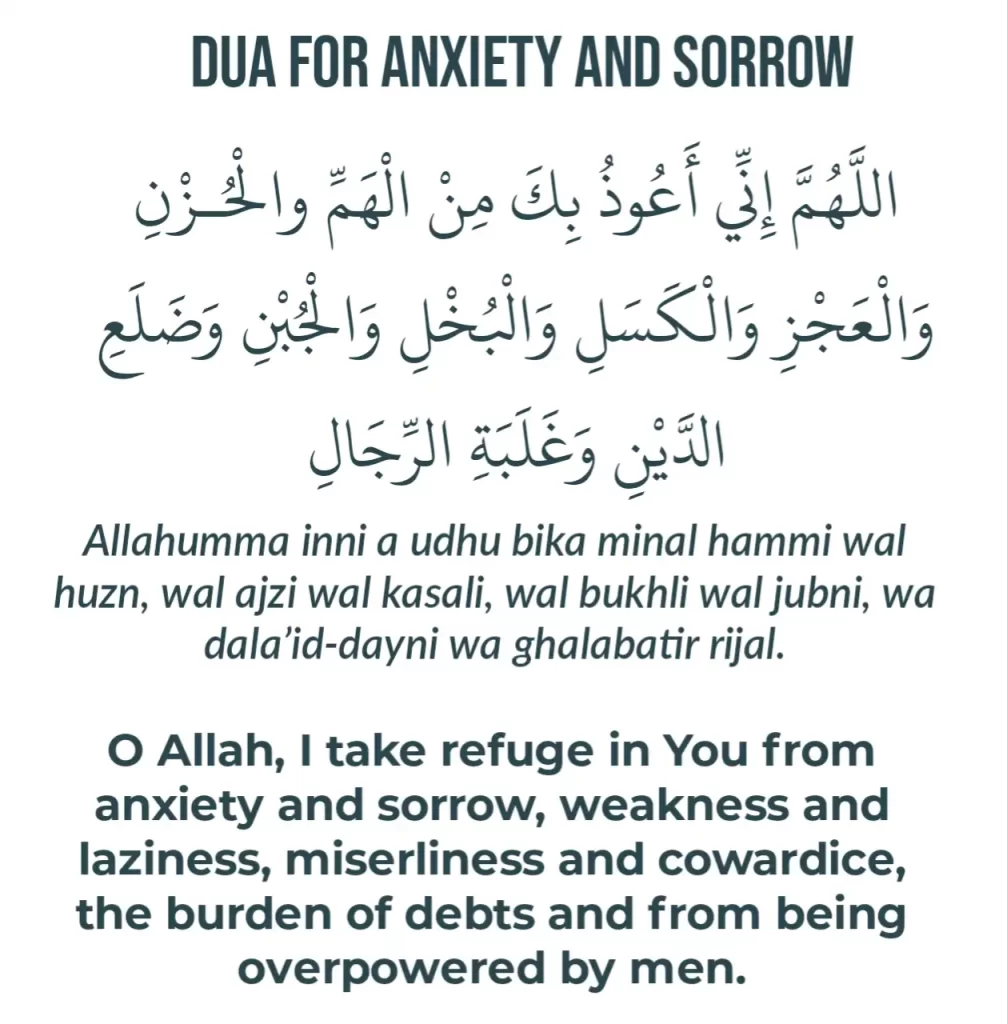
The Dua was narrated by the Prophet (SAW) in Saheeh Bukhari and many ahadeeth that the Prophet (SAW) would consistently make this dua, and many of the Companions heard him repeat it over and over.
RELATED ARTICLES:
Advertisements
- Allahummahdini Wa Saddidni Meaning and Arabic Text
- Allahumma Hawalaina Wala Alaina
- Allahumma Inni Asbahtu In Arabic And Meaning
Meaning Of Allahumma Inni A’uzu Bika Minal Jubni Wal Bukhli
- Al-Hamm (anxiety): Hamm literally means ‘to make uneasy and anxious.
It’s the kind of distress that affects one’s head, heart, and body. This grief bothers a person, and it is his or her main concern.
Because it is an anxiety that one feels about something that may or may not happen, Hamm leaves a person preoccupied with one’s ideas, mulling over them again and again in one’s mind.
If you’ve ever experienced melancholy, anxiety, or nervousness, you know how debilitating it can be.
- Huzn (sorrow) also signifies sadness, although it is not the same as Hamm.
Huzn is grief that arises as a result of a traumatic incident, such as the death of a loved one or a difficult scenario.
The year Abu Talib and Khadija (radi Allahu anha) died is known as ‘Aam al Huzn, the Year of Grief,’ in the Seerah.
Allah ta’ala mentions many times in the Qur’an that the Believers will not “yahzanoon,” or grieve, in the hereafter.
This means that the believers will not grieve over anything that has happened in the past.
Huzn is to be full of sorrow, mourning, grief, and sadness.
- Ajaz means ‘to become weak, to lack strength, to be incompetent, and to be a failure.
- Kasl means to be lazy, idle, slow, negligent, and inert.
- Al-Bukhl means to be stingy and greedy.
This word is used by Allah in the Qur’an to characterise those who have wealth to donate but hoard it instead of giving it to charity.
Bukhl means refusing to provide anything legal (charity, time, etc.) that you have plenty of.
It is to prefer it for oneself, and because of this desire, a good object (such as riches) is never put to good use.
This word is the polar opposite of karam, which means to be generous and generously give.
Al-Kareem is one of Allah’s names, meaning “The Most Generous,” who generously distributes from his infinite riches without expecting anything in return.
- Jubn literally means ‘to shrink,’ and the idea of becoming cowardly and fearful is derived from this.
- Dala’a: This is the word for rib (a bodily part), and it has two linguistic roots: curvature and weight.
As a result, “dala’a ad-dayn” can refer to either the tendency for debt to pull individuals away from righteousness or the weight that comes with being in debt.
- Ghalabah means ‘to be dominated, subdued, or overtaken.
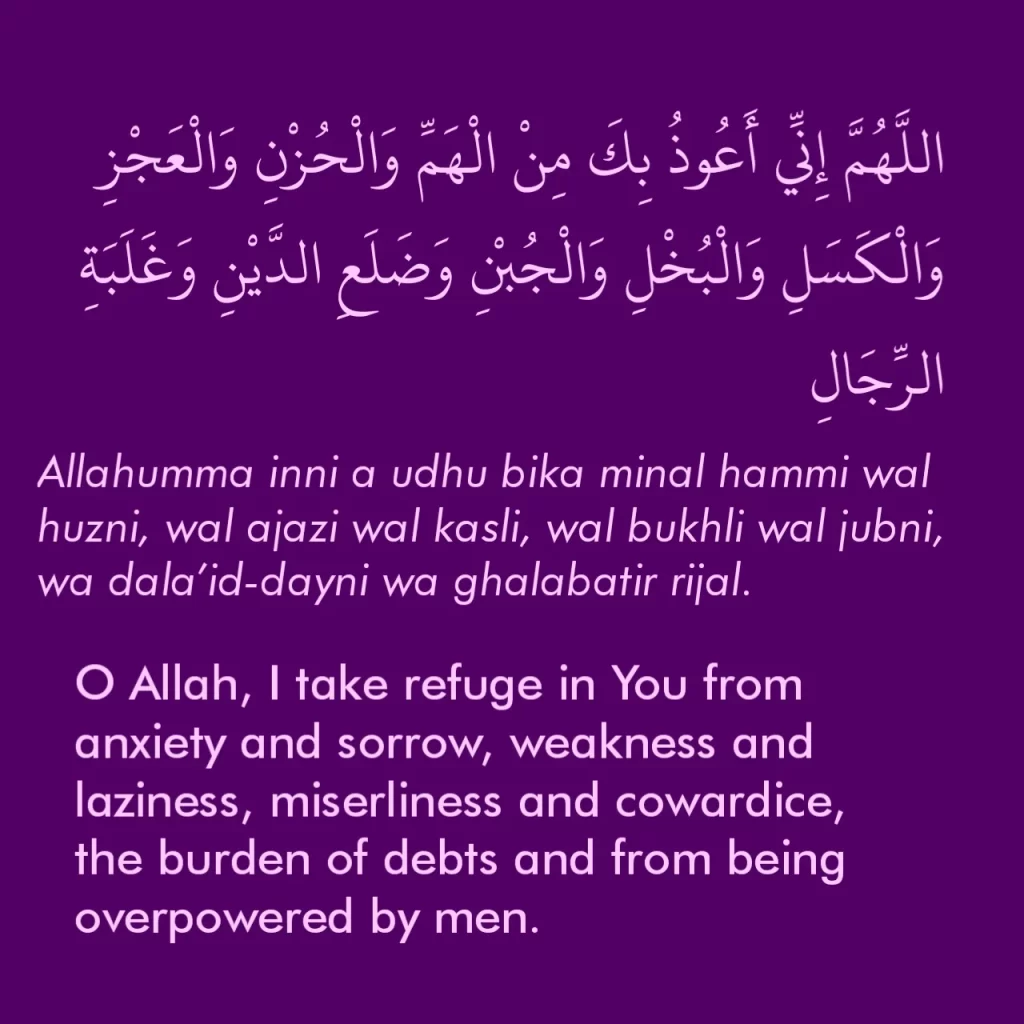
Hadith Related To This Dua
عَنْ أَنَسِ بْنِ مَالِكٍ، قَالَ كَانَ لِرَسُولِ اللَّهِ صلى الله عليه وسلم دَعَوَاتٌ لاَ يَدَعُهُنَّ كَانَ يَقُولُ” اللَّهُمَّ إِنِّي أَعُوذُ بِكَ مِنَ الْهَمِّ وَالْحَزَنِ وَالْعَجْزِ وَالْكَسَلِ وَالْبُخْلِ وَالْجُبْنِ وَغَلَبَةِ الرِّجَالِ
Meaning:
It was narrated that Anas bin Malik said:”The Messenger of Allah [SAW] had supplications that he never omitted to recite. He used to say:
‘Allahumma inni a’udhu bika minal-hammi, wal-hazani, wal-‘ajzi, wal-kasali, wal-bukhli, wal-jubni, wa ghalabatar-rijal (O Allah, I seek refuge with You from worry, grief, incapacity, laziness, miserliness, cowardice and being overpowered by (other) men.)”
Source: Sunan an-Nasa’i 5449
Benefits Of Allahumma Inni A’uzu Bika Minal Jubni Wal Bukhli
- It’s fine to experience these feelings. You are not any less of a believer because you are anxious or depressed. The difference between a believer and a non-believer is that the believer is patient and seeks help from Allah.
- If you are facing a disaster, repent of your sins since you never know if the disaster is the result of your own misdeeds.
One of the salaf said,
“I disobey Allah to find its effect in the way my animal behaves and my wife [treats me].”
Ibn Zayd said, “Sins overcome the hearts until no good can get through to them.
- Always, the believer is in a win-win situation.
The messenger of Allah SAW said,
The affair of the believer is amazing! The whole of his life is beneficial, and that is only in the case of the believer. When good times come to him, he is thankful and it is good for him, and when bad times befall him, he is patient and it is also good for him.”
[Muslim]
- When you encounter these feelings or pain, Allah purifies you.
The Prophet (may peace be upon him ) said,
No fatigue, nor disease, nor sorrow, nor sadness, nor hurt, nor distress befalls a Muslim, even if it were the prick he receives from a thorn, but that Allah expiates some of his sins for that.” [Bukhari]
- Because the attributes described in this supplication all hint to weakness, we should make this dua and work on ourselves to eliminate them from our personalities.
- When something bad happens to you or you do something you later regret, don’t say “if.” “Seek Allah’s help and do not lose heart.
The Prophet (sal Allahu alayhi wa sallam) said,
Seek help from Allah and do not lose heart, and if anything (in the form of trouble) comes to you, don’t say: If I had not done that, it would not have happened so and so, but say: Allah did what He had ordained to do and your ‘if’ opens the (gate) for Shaytan.” [Muslim]
- Only complain your grievances to Allah.
- When we are faced with adversity, many of us turn to venting or complaining to others, yet the Qur’an shows that believers only complain to Allah.
- We will undoubtedly be put to the test and pushed to our limits, each to our own degree.
- Have positive thoughts and hopes about Allah, and believe that He only sends what is good for you.
- Allah is, without a doubt, the Best of Planners, so be assured that you do not have to make your own decisions; rather, The One who knows what is in the heavens and earth is the One who plans your affairs.
- Remember the grief you had when you thought something was beneficial for you but Allah did not want it for you, and then later you realised how great that plan was for you.
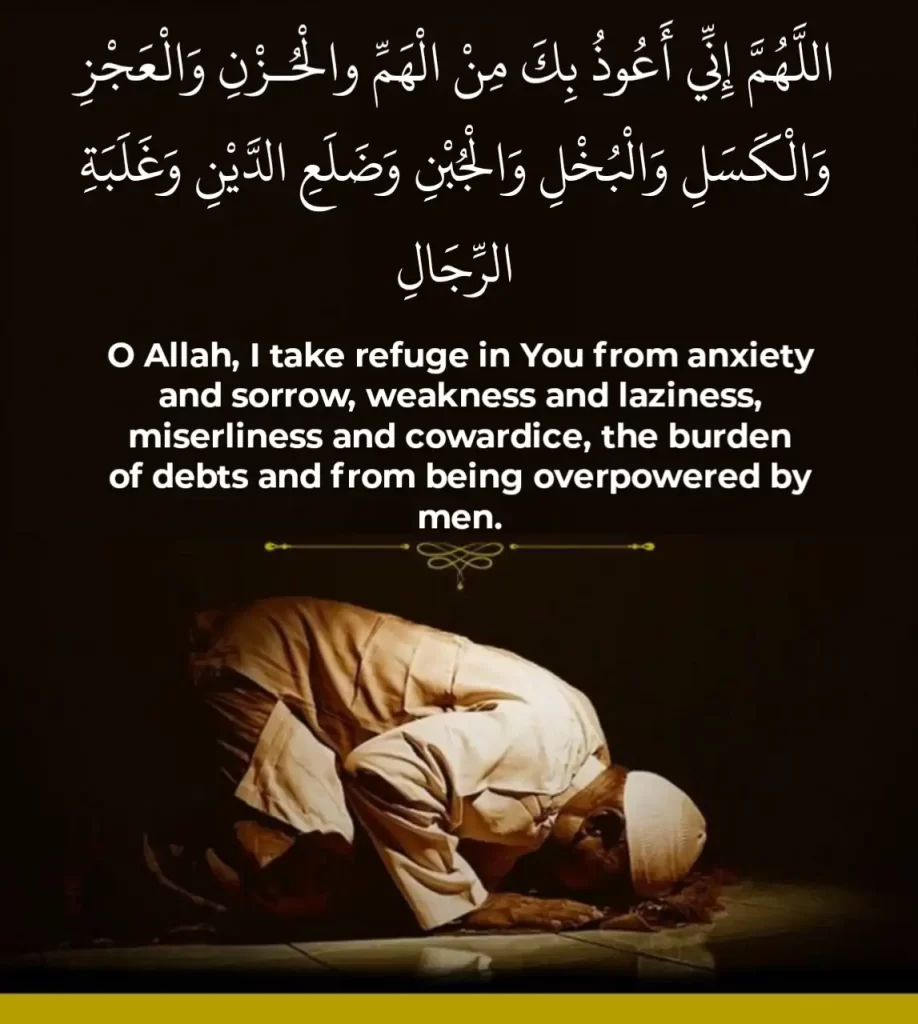
Breakdown of the dua
1. Seeking Refuge in Allah: This dua begins with a powerful declaration of reliance on Allah, seeking refuge in Him. It acknowledges that in times of difficulty and distress, only Allah can provide protection and relief.
2. Anxiety and Sorrow (Gham and Huzn): The dua seeks protection from anxiety and sorrow. It’s a plea for emotional well-being and a reminder that Allah can alleviate the burdens of the heart, bringing peace and contentment.
3. Weakness (Da’f) and Laziness (Kasal): This part of the dua asks for protection against physical and mental weaknesses. It’s a request for strength and motivation to fulfill one’s responsibilities and duties without succumbing to lethargy.
4. Miserliness (Bukhl) and Cowardice (Jubn): Seeking refuge from miserliness and cowardice is a plea for moral and emotional courage. It implores Allah to grant the supplicant the strength to be generous and brave, even in the face of challenges.
5. The Burden of Debts (Ghalabat Al-Dain) and Overpowering by Men (Qahr Al-Rijal): This part of the dua acknowledges the financial and social pressures that can weigh heavily on an individual. It’s a request for relief from the burden of debts and from being overpowered or oppressed by others, emphasizing the importance of financial security and personal dignity.
6. Overall Well-Being: This dua encompasses various aspects of well-being, encompassing emotional, physical, moral, financial, and social dimensions. It reflects the holistic nature of supplication in Islam, where believers seek Allah’s protection and blessings in all areas of their lives.
Conclusion
In summary, this beautiful dua is a comprehensive plea for protection and well-being in various aspects of life. It acknowledges the challenges and vulnerabilities people face and asks Allah for strength, courage, and relief from difficulties.
It serves as a reminder of the importance of faith and reliance on Allah in seeking solace and strength during times of hardship.
Advertisements

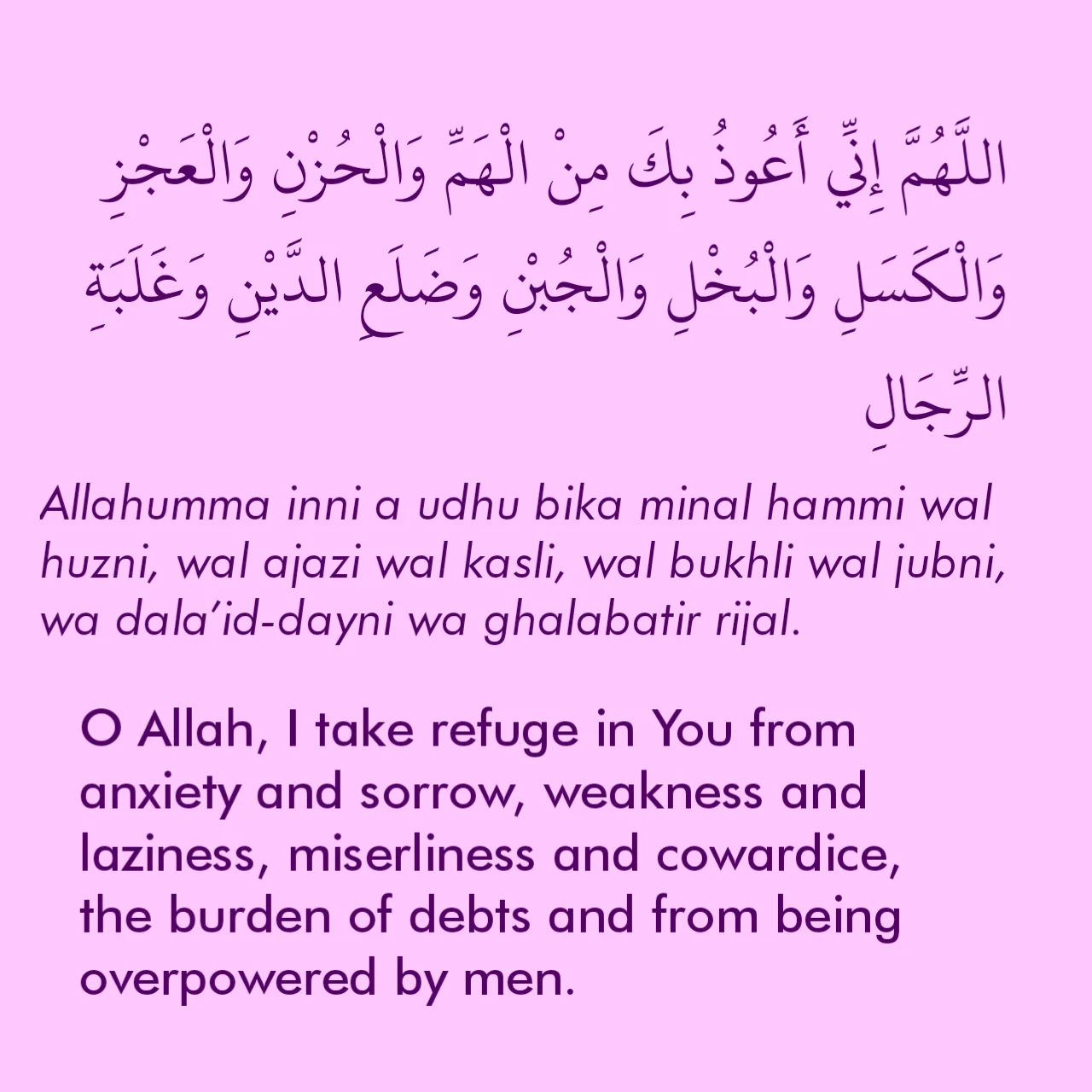
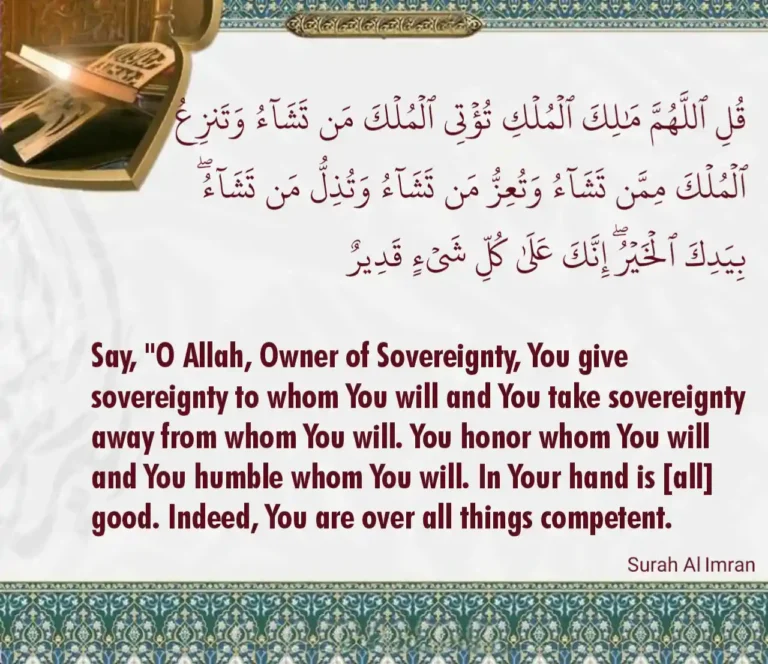

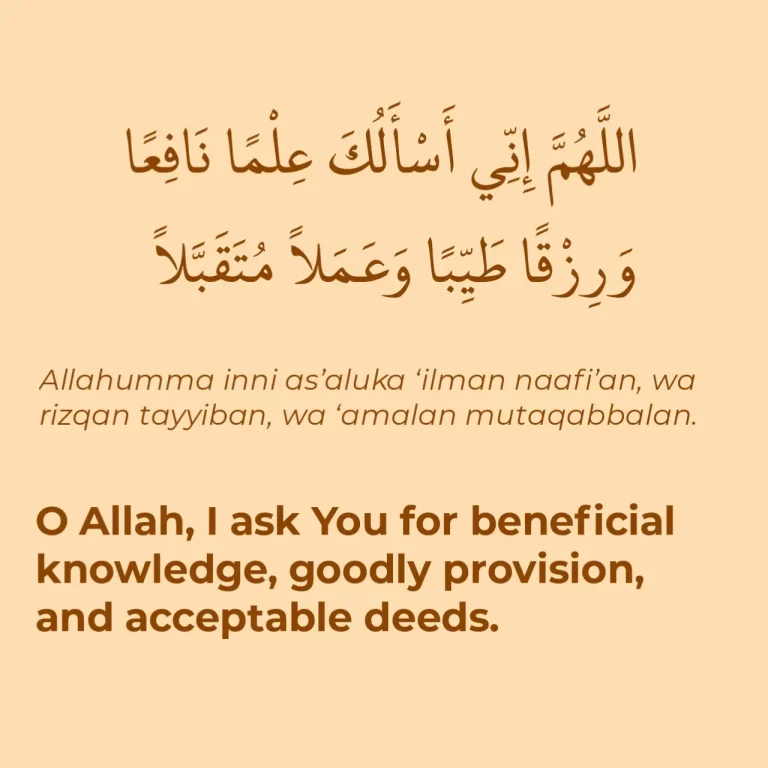
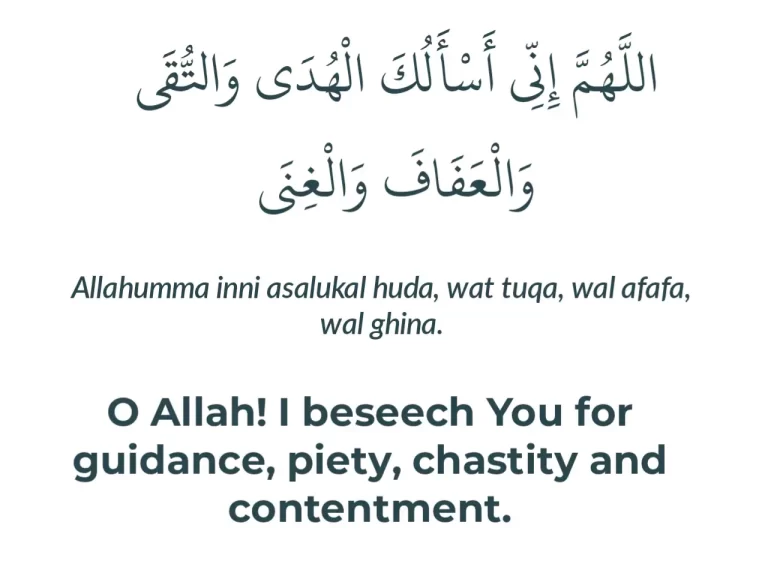

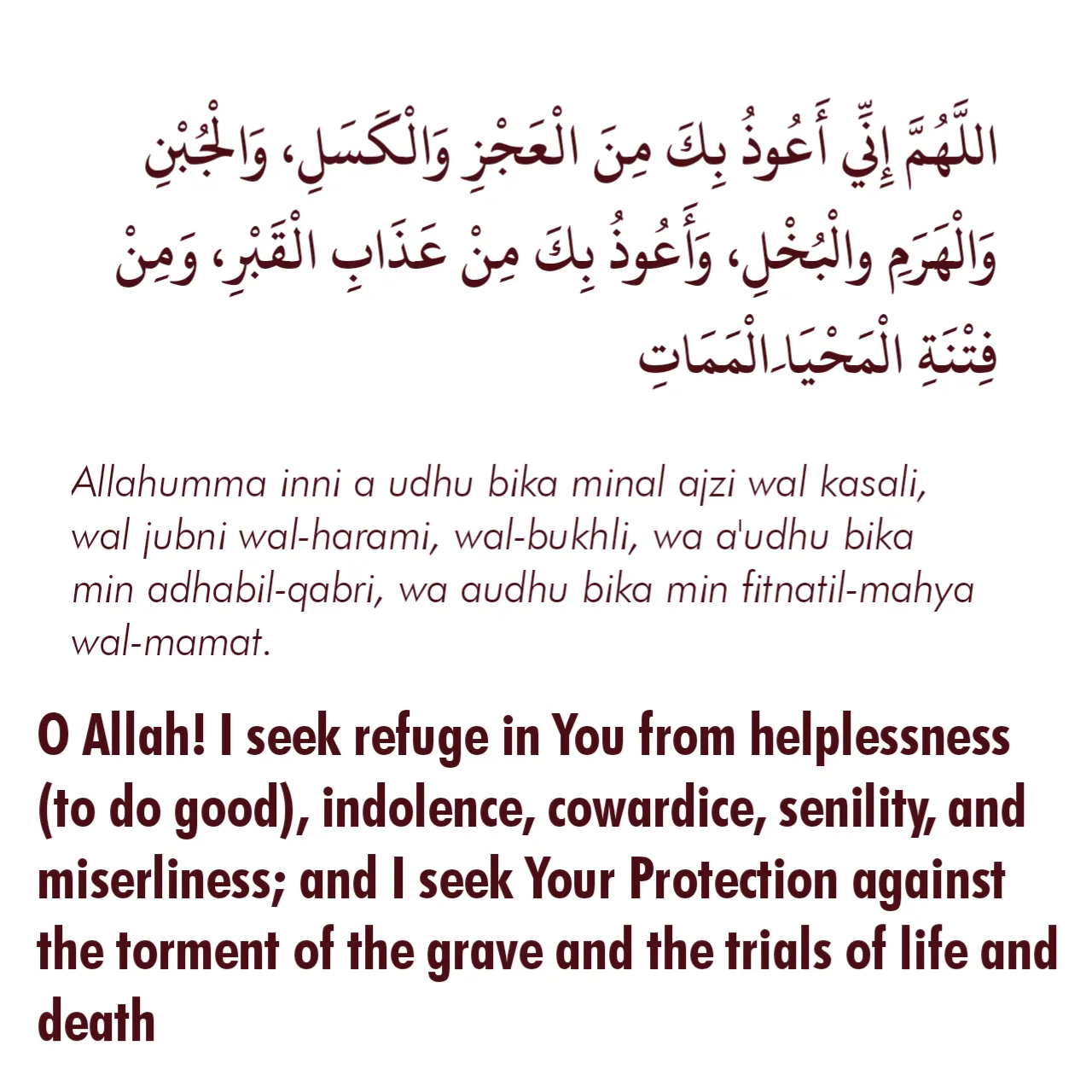
2 Comments